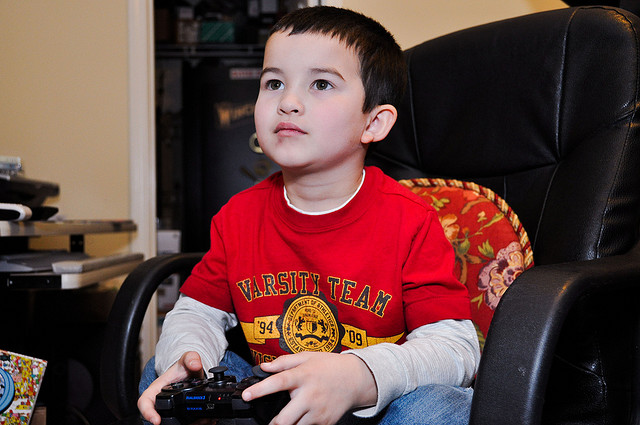
“When people learn to play videogames,” according to James Paul Gee, “they are learning a new literacy.”
This is one of the reason kids love playing them: They are learning a new interactive language that grants them access to virtual worlds that are filled with intrigue, engagement and meaningful challenges. And one that feels more congruent with the nature and trajectory of today’s world.
As our commerce and culture migrates further into this emerging digital ecosystem it becomes more critical that we develop digital literacy, of which videogames inhabit a large portion.
Gee, a linguist and professor of literacy studies at Arizona State University, thinks we should expand the traditional definition of literacy beyond reading and writing because language isn’t the only communication system available in today’s world. And there is no better example of a new form of media that communicates distinctive types of meaning than videogames.
The literacy of problem-solving

Although games can be immensely entertaining, it would be a mistake to consider them as only a form of entertainment. Games are fun, but their real value lies in leveraging play and exploration as a mode of learning the literacy of problem-solving, which lowers the emotional stakes of failing.
In Sir Ken Robinson’s TED talk, Do Schools Kill Creativity?, he reminds us that our educational system has stigmatized mistakes. As a result, kids are frightened of being wrong. Yet if we are not prepared to be wrong than we won’t be able to come up with anything creative or solve complex problems. Videogames, on the other hand, embed trial and error into the foundation of gameplay.
Kids aren’t naturally great at gaming the first time. They develop mastery through disciplined practice — a path marked by dead-ends, wrong turns and blunders. Yet gamers aren’t angst-ridden about making wrong decisions because games encourage a growth mindset. Mistakes are how one figures out what doesn’t work and provides the impetus to zero in on what might.
Conversely, the game of modern education revolves around right and wrong answers. Now this kind of learning may be appropriate in some instances, say, when you want a student to remember the capitals of countries. That method is important, but it can only take you so far. It certainly can’t penetrate more sophisticated, and I would argue, more important questions, such as: How does geography shape culture?
Games on the other hand, cultivate problem-solving, that, with that right kind of scaffolding, could begin to gain traction with these more exploratory questions and knowledge.
Focusing on the process, not the content
Much of the critique leveled at videogames is oriented around their content. In Everything Bad Is Good For You, Steven Johnson writes of a hypothetical high school English teacher admonishing videogames’ lack of content: “There’s no psychological depth here, no moral quandaries, no poetry. And he’d be right! But comparing these games to ‘The Iliad’ or ‘The Great Gatsby’ or ‘Hamlet’ relies on a false premise: that the intelligence of these games lies in their content, in the themes and characters they represent.”
Games are based on problems to solve, not content. This doesn’t mean that game-based problem-solving should eclipse learning content, but I think we are increasingly seeing that a critical part of being literate in the digital age means being able to solve problems through simulations and collaboration.
Videogames, and the type of learning and thinking they generate, may serve as a cornerstone for education and economies of the future.
In their book, Rethinking Education in the Age of Technology, Allan Collins and Richard Halverson state that “policymakers interested in preparing students for success in the 21st-century economy would do well … to appreciate how skills developed through navigating virtual environments might pay off in the workplace … [and how] the new skills and dispositions of the gamer generation will transform the workplace. The gamer generation will push for work environments to incorporate more virtual aspects in fields, such as market analysis, and social and economic modeling. Gamers, for example, have abundant experience making big decisions, coordinating resources, and experimenting with complex strategies in game-based simulations.”
Making the most of gaming for your kids
Although videogames have great potential to be powerful vehicles for learning, there is no guarantee this will happen. Just as there is no guarantee that someone will understand the themes and symbols of “The Lord of the Flies” by simply reading it. As a result, kids need parents, teachers and their peers to engage their gaming in thoughtful ways. While there could be a long list of recommended practice, for simplicity sake I’ve reduced the list to three preliminary suggestions.
- Play games. Otherwise how can you have meaningful conversations about them? Not learning how to play games would be akin to talking about “The Lord of the Flies” without having learned to read.
- Connect games to books, movies, TV and the world around them. By thinking about games beyond their boundaries we can cultivate pattern recognition across media platforms and parlay the problem-solving of gaming into the real world.
- Have your students or kids collaborate with other peers to analyze and interpret games, as well share strategies. There has been a raft of research in recent years that extols the wisdom of the crowd and the logic of the swarm. Through collaboration and networking kids can learn to enhance their own perspectives, ideas and, perhaps, contribute to a whole that is greater than the sum of its parts.
Read more in the Kids & Media series on MediaShift.
Photo of kids playing videogames by Sean Dreilinger on Flickr.
Aran Levasseur has an eclectic background that ranges from outdoor education to life coaching, and from habitat restoration to video production. For the last five years he’s taught middle school history and science. From the beginning he’s been integrating technology into his classes to enhance his teaching and student learning. He recently gave a talk at TEDxSFED on videogames and learning. Currently he’s the Academic Technology Coordinator at San Francisco University High School.

